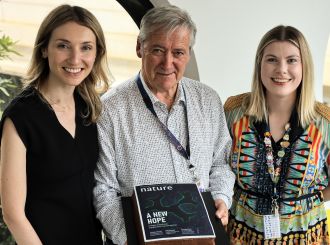News release
From:
In research published today in the prestigious journal Nature, Melbourne scientists have shown that the body’s own immune system can be used to stop the progression of ovarian cancer.
Professor Paul Hertzog’s research group at Hudson Institute of Medical Research has been working to expand on their discovery of a naturally occurring signalling protein found in the female reproductive tract, Interferon epsilon (IFN-e), and its potential application in treatment of this deadly disease.
Their work involves harnessing the body’s own system of signalling proteins to fight ovarian cancer, with their latest research published worldwide overnight.
Dr Nicole Campbell has been working for several years on understanding how these treatments which target the body’s immune system can be optimised to improve its ability to fight the tumour.
“Immunotherapies have been very successful in the treatment of other types of cancer, but they have had limited success in ovarian cancer – we’re looking to change that,” Dr Campbell said.
“We know that in High Grade Serous Ovarian Cancers (the commonest form of ovarian cancer) tumour cells recruit and activate ‘immunosuppressive’ cells which prevent anti-tumour immune cells from killing tumour cells, so we’re aiming to develop new therapeutics which can reverse that process and improve survival rates.”
Professor Hertzog said that last year more than 1,000 Australians died of ovarian cancer, and the likelihood of living more than 5 years with the disease is still less than 50 per cent.
"It is often diagnosed late, and the most common treatments have limited effectiveness, with resistance to chemotherapy a major factor. It is a disease where new insights were needed, Prof Hertzog said”.
Dr Campbell’s work in the study of IFNε also formed the PhD project of Dr Zoe Marks, which established that the protein protects against ovarian cancer via tumour cells as well as the body’s immune system.
This work was co-supervised by post-doctoral scientist Dr Nollaig Bourke, from Trinity College Dublin, who found that women with high grade serous ovarian cancer no longer had the normal expression of interferon epsilon.
“This was really interesting to us as we knew that interferon epsilon was part of a family of proteins known for their anti-tumour activities and we wondered what would happen if we could try restore this lost expression,” Dr Bourke said.
"We tried giving interferon epsilon back to help block the growth of ovarian cancer cells and therefore prevent the growth of primary and secondary tumours. The results were very striking, confirming that interferon epsilon was a very effective tumour suppressor in ovarian cancer,” Dr Bourke said.
Prof Hertzog explained that since his laboratory’s discovery of Interferon epsilon in 2004, a great deal of progress has been made, with Hudson Institute leading the world.
“At Hudson Institute we are now able to produce pure IFN-e, which allows us to conduct incredibly valuable research into how and where it can be used most effectively,” he said.
“We now know that Interferon epsilon is naturally made in the epithelium lining organs such as the female reproductive tract where it acts as a natural booster of immunity to infections. Our recent discovery is that it also acts as a tumour suppressant, and that it is lost during the process of ovarian tumour formation.
“We know from pre-clinical models that administering it will dramatically inhibit ovarian cancer growth, particularly in cases where the cancer has metastasised into the peritoneal cavity,” Prof Hertzog said.
To read the paper ‘Interferon-ε is a novel tumour suppressor and restricts ovarian cancer’ published in Nature follow this link: https://www.nature.com/articles/s41586-023-06421-w
Facts
· Ovarian cancer is frequently diagnosed in the advanced stages;
· The 5-year survival rate is less than 50%. This figure has not changed in 50 years;
· Symptoms of ovarian cancer are vague. For many women, the only signs are cramps, bloating, feeling full or needing to urinate more often—all symptoms which mimic common female complaints;
· Invasive surgery is currently the only way of detecting and accurately diagnosing ovarian cancer;
· Many women enter hospital to undergo exploratory surgery, but most will wake to find they have undergone a complete hysterectomy;
Multimedia




 Australia; VIC
Australia; VIC

